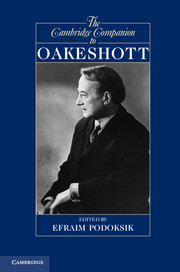Book contents
- Frontmatter
- Introduction
- Part I Oakeshott's philosophy
- Part II Oakeshott on morality, society and politics
- 6 Practical life and the critique of Rationalism
- 7 Oakeshott's ideological politics: conservative or liberal?
- 8 Rhetoric and political language
- 9 Oakeshott's On Human Conduct
- 10 Oakeshott's political theory: recapitulation and criticisms
- Part III Oakeshott and others
- Index
7 - Oakeshott's ideological politics: conservative or liberal?
from Part II - Oakeshott on morality, society and politics
Published online by Cambridge University Press: 28 September 2012
- Frontmatter
- Introduction
- Part I Oakeshott's philosophy
- Part II Oakeshott on morality, society and politics
- 6 Practical life and the critique of Rationalism
- 7 Oakeshott's ideological politics: conservative or liberal?
- 8 Rhetoric and political language
- 9 Oakeshott's On Human Conduct
- 10 Oakeshott's political theory: recapitulation and criticisms
- Part III Oakeshott and others
- Index
Summary
INTRODUCTION
Michael Oakeshott has always been hard to characterize in terms of political doctrines and ideological persuasions. Everyone agrees he is a sceptic, but there is much less agreement as to what his scepticism implies for politics. Is he a sceptical liberal in the line of Tocqueville and Acton? Or a sceptical conservative in the line of Hume? Or is he sceptical of all politics? He constantly refused conventional political labels, whether Left or Right, liberal or conservative, regarding them as the product of that rationalism in politics he so deplored. He firmly declared that his thought had nothing to do with ideology, the most common form of Rationalist doctrine. Ideology was intellectually empty and had corrupted politics. Ideologies, according to Oakeshott, have supplanted traditions of behaviour, providing cribs for behaviour rather than an education in the activity itself. An ideology is an ‘abstract principle or set of related abstract principles which has been independently premeditated’.
Despite these strictures, however, Oakeshott is still regularly claimed as a conservative political philosopher, regarded by many as the most significant conservative philosopher of the twentieth century, and regularly cited by conservative politicians and commentators as an important influence. He was even offered a knighthood by the Thatcher government in the 1980s, but declined it. In many of his reviews and articles Oakeshott appears to be sympathetic to the conservative tradition, at least in England.
- Type
- Chapter
- Information
- The Cambridge Companion to Oakeshott , pp. 153 - 176Publisher: Cambridge University PressPrint publication year: 2012
- 2
- Cited by



